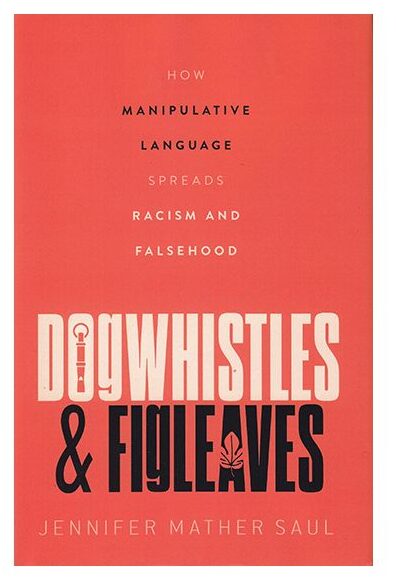
A while ago, I reviewed Jennifer Mather Saul’s Dogwhistles and Figleaves (Oxford UP, 2024) for Choice. It occurred to me that the timeliness of the book warranted a longer discussion and this it.
Saul is a philosopher at the University of Waterloo who has written extensively on lying and here she addresses the way in which racist expressions and blatant lies change, and have changed, the fabric of public discourse. The thesis of her book is summarized in its subtitle: How Manipulative Language Spreads Racism and Falsehood. More specifically, Saul connects to two increasingly pervasive aspects of recent public/political discourse: the spread of explicit racism and the normalization of blatant falsehoods. She argues, convincingly I think, that two phenomena reinforce one another.
She begins with racism and racism dogwhistles—coded appeals to racism or other hate speech. Saul develops her position in classic philosopher-style, advancing and refining various definitions and illustrating them with real life examples. She gives a good (though perhaps too long) typology of dogwhistles including covert ones (states’ rights, ghetto, bad hombres) and overt (88, triple-parentheses) ones as well as unintentional ones (terms like urban.
Figleaves, in turn, are rhetorical strategies for attenuating—covering over—the racism of the dogwhistles. These include expressions like “That’s not what I meant,” “You’re reading too much into my words,” “You are being too sensitive,” “I didn’t mean it that way” or “I was joking” or phrasing like “until we can figure out what’s going on.” They cover up the appeal to racism even though many people know what’s underneath.
As you may have guessed from the examples, Donald Trump plays a big role in the discussion. Though he is not the only figure to employ the dogwhistle plus figleaf method of gaslighting, he is the source of many of her examples.
Central to Saul’s book is a typology of racism, which includes institutional racisms, individual racism based in beliefs of superiority/inferiority, and racism based on attitudes and stereotypes. Also important is the way that social norms concerning racism segment a population: there are groups of norm opposers (overt racists), strong norm supporters, and a group who might be characterized as “doubters.” The norm opposers like neo-Nazis embrace the racisms of the dogwhistles; norm supporters see it for what it is and call it out. Potential doubters are those who might be persuaded that a dogwhistle is not racist based on the use of figleaves. To the extent that figleaves change the perception of racist expressions for potential doubters, more racist discourse occurs and the norms will shift, allowing racist speech to be normalized.

Jennifer Mather Saul
The second part book concerns falsehood, noting that today’s deceptions are more pernicious than much previous political lying by politicians like Johnson or Nixon. The idea of a “credibility gap” is no longer newsworthy, but expected. Saul explores how it has become acceptable for politicians to say things that are totally at odds with the truth and how figleaves like “I’m just asking questions” or “A lot of people are saying” or “I saw a report on television” have allowed lies and conspiracist claims to become part of mainstream discourse and to drown out other less sensational topics. She touches on lies ranging from birtherism to QANON to Covid to the Great Replacement to crowd sizes and the nature of the January 6th insurrection. To these we could now add the lie that immigrants in Ohio are “eating the cats.” Saul argues that while it may not be that conspiracy theories are on the rise (they’ve always been with us), extreme conspiracy theories are playing a greater role in public discourse, especially of national political figures and even parties. The result suggests an eroding of the belief in previously credible institutions and in truth itself.
Saul sees the potential solution in what she calls “inoculation,” public education about the ways in which dogwhistles and figleaves infect the body politic. So far, there is no widespread plan for such an inoculation and the institutions that might do such work (the media, academe, professional in government and law) are being undermined and attacked.
Everyone should read Dogwhistles and Figleaves. Saul’s style is generally accessible but one error needs to be pointed out: in the discussion of conspiracism, RFK, Jr., is referred to as JFK, Jr. (p. 153). And stylistically, I believe the leaves in figleaves should really be leafs, because they are non-literal.

 Follow
Follow